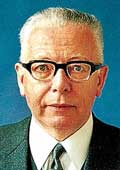 |
Gustav Walter Heinemann
b. 23 Jul 1899, Schwelm, Westphalia, German Reich
d. 7 Jul 1976, Essen, West Germany |
| Title: |
Bundespräsident (Federal President) |
| Term: |
1 Jul 1969 - 30 Jun 1974 |
| Chronology: |
5 Mar 1969,
elected, session of the Bundesversammlung (Federal Assembly), Ostpreußenhalle, West Berlin [1] |
| |
1 Jul 1969,
took an oath of office as Federal President, joint session of the Bundestag and Bundesrat, Bonn [2] |
| |
30 Jun 1974, expiration of term |
| Biography: |
| Participated in World War I as soldier (1917-1918); studied in several German cities and was an activist of a student group of the German Democratic Party (Deutsche Demokratische Partei, DDP); after his graduation he settled in Essen where he was admitted to the bar; worked as a lawyer for the Rhine steelworks (Rheinstahl) in Essen (1928-1936); was promoted to manager (1936); continued his public work as chairman of the Christian Youth Association in Essen (1936-1950); was made mayor of Essen (1945-1949) by the British occupation authorities and actively participated in setting up a Christian Democratic Union (Christlich Demokratische Union, CDU) branch organisation in the city; was elected to the Landtag of North Rhine-Westphalia; shortly held a portfolio of justice minister in the government of North Rhine-Westphalia (1947-1948) and then assumed the office of federal minister for internal affairs in the Cabinet of Konrad Adenauer (1949-1950); resigned in response to rearmament programme proposed by Adenauer; a convinced pacifist, he withdrew from CDU (1952) and organised the All-German People's Party (Gesamtdeutsche Volkspartei, GVP) which existed until 1957; severely criticised Adenauer's politics and blamed him for the failure of German unification and for militarization; after the fall of Adenauer, he became federal justice minister (1966-1969) in the Cabinet of Ludwig Erhard; was elected to the office of the Federal President by a narrow majority of the 5th Bundesversammlung (Federal Assembly) in 1969; supported the Ostpolitik ("eastern policy") of Federal Chancellor Willy Brandt targeted at the improvement of relations with East Germany, other Communist nations in eastern Europe, and the Soviet Union; his personal integrity and modesty exempted him from the right-wing criticism; survived an attempt on his life (1972) made by a young gardener from Hamburg; refused to be nominated for re-election because of his advanced age. |
| Biographical sources: "Die Bundespräsidenten: Biographien eines Amtes", by Günther Scholz (Heidelberg: Decker & Müller, 1990). |
| Elections: |
| Candidate (party) |
1st vote (5 Mar 1969) |
2nd vote (5 Mar 1969) |
3rd vote (5 Mar 1969) |
| Gustav Heinemann (SPD) |
514 |
511 |
512 |
| Gerhard Schröder (CDU/CSU) |
501 |
507 |
506 |
| abstentions |
5 |
5 |
5 |
| invalid |
3 |
0 |
0 |
| total votes cast |
1,023 |
1,023 |
1,023 |
| total votes/absolute majority: |
1,036/519 |
1,036/519 |
1,036/519 |
|
| Source of electoral results: Verhandlungen des Deutschen Bundestages, 5. Wahlperiode, Bd. 69, Anhang, S. 1-9. |
| |
| [1] |
Verhandlungen des Deutschen Bundestages, 5. Wahlperiode, Bd. 69, Anhang, S. 1-9. |
| [2] |
Verhandlungen des Deutschen Bundestages, 5. Wahlperiode, Bd. 70, S. 13661ff. |